Physical Address
304 North Cardinal St.
Dorchester Center, MA 02124
Physical Address
304 North Cardinal St.
Dorchester Center, MA 02124

Journey through ten legendary hiking trails with hidden histories that will completely change how you experience these world-famous treks forever.
Did you know that the world’s most celebrated hiking trails weren’t originally designed for trekkers? Most evolved from ancient trade routes, pilgrimage paths, or indigenous hunting trails. You’ll discover that each of these ten legendary hikes carries centuries of human history beneath your boots—from Inca messengers racing to Machu Picchu to Sherpa traders crossing Himalayan passes. Understanding these cultural foundations completely transforms how you’ll experience each step, and there’s one essential detail about choosing your first epic trek.
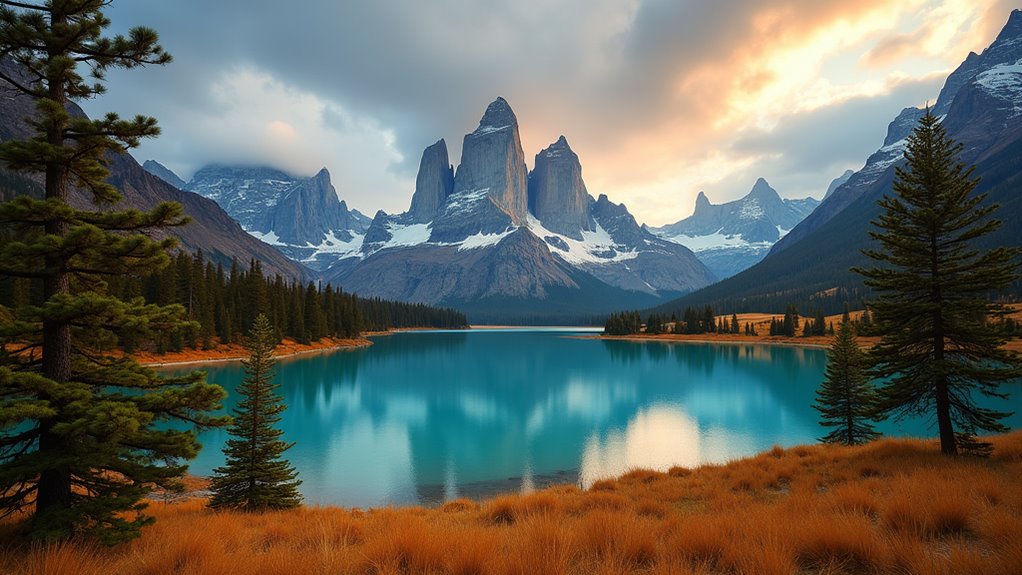
Patagonia’s crown jewel awaits you on the Torres del Paine W Circuit, where jagged granite spires pierce the sky and turquoise lakes mirror some of Earth’s most dramatic landscapes. You’ll trek 50 miles through Chile’s wilderness over four to five days, encountering three iconic viewpoints: the towering Torres themselves, the hanging French Glacier, and Grey Glacier’s floating icebergs.
Book refugios months ahead – they fill quickly during peak season (December-March). Pack layers for unpredictable weather; conditions shift from sunshine to howling winds within minutes. Start early each day to avoid afternoon gusts that can knock you sideways.
The circuit demands moderate fitness, but rewards you with unparalleled vistas. Chilean guides often share gaucho stories around evening fires, adding cultural depth to your Patagonian adventure. This incredible journey consistently ranks among the world’s best hikes for its combination of challenging terrain and breathtaking scenery.
Why do millions dream of reaching Everest Base Camp when only a fraction actually make the journey? You’ll discover the answer trekking through Nepal’s Khumbu region, where Sherpa culture thrives alongside towering peaks.
The 12-day trek from Lukla demands serious preparation. You’ll face altitude sickness above 3,500 meters, so acclimatize properly with rest days in Namche Bazaar and Dingboche. Don’t rush—your body needs time to adapt.
Pack layered clothing for temperature swings from scorching sun to freezing nights. Teahouses provide meals and lodging, but bring water purification tablets.
Respect Sherpa customs: walk clockwise around Buddhist monuments, remove shoes in gompas, and tip generously. These mountains aren’t just scenic backdrops—they’re sacred spaces.
At 5,364 meters, Base Camp rewards you with unparalleled Himalayan views and profound personal achievement. Consider leveraging the share economy to split equipment costs with fellow trekkers, making this bucket-list adventure more affordable.
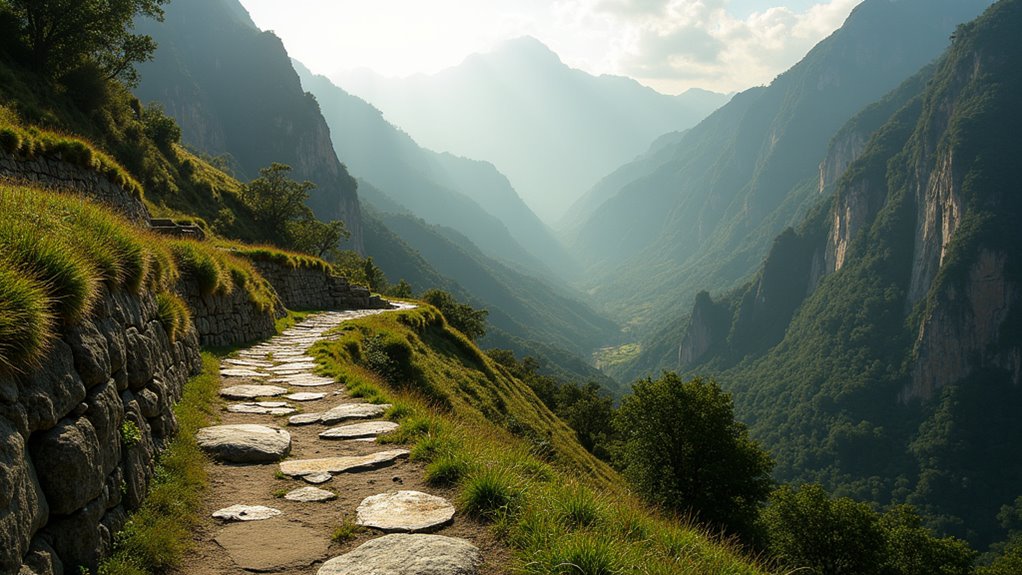
While countless trekkers flock to Peru’s most famous trail, you’ll find the four-day Inca Trail to Machu Picchu offers far more than just Instagram-worthy ruins. You’ll climb through diverse ecosystems, from cloud forests to alpine tundra, passing ancient Incan sites like Wiñay Wayna that rival Machu Picchu itself.
Dead Woman’s Pass at 13,828 feet will test your lungs, but the sunrise over the Sun Gate makes every labored breath worthwhile. Book six months ahead—permits sell out fast. Pack layers for dramatic temperature swings and bring coca leaves for altitude adjustment like locals do.
The trail’s restricted to 500 people daily, preserving its mystique. You’re not just hiking; you’re following sacred Incan footsteps through history, making this trek spiritually transformative beyond its physical challenges. For those seeking more hiking adventures after Peru, America offers exceptional hiking cities with diverse trail systems and stunning landscapes to explore.
From South America’s ancient pathways, we move to Europe’s crown jewel of long-distance hiking. The Tour du Mont Blanc circles Western Europe’s highest peak through three countries, offering you 170 kilometers of alpine perfection.
You’ll traverse valleys where French, Italian, and Swiss cultures blend seamlessly. Each refuge serves local specialties—from tartiflette in Chamonix to polenta in Courmayeur. The trail demands respect; weather changes rapidly at altitude.
This trek delivers unforgettable moments:
You’ll complete this circuit forever changed by Europe’s most magnificent mountains. This route stands among the world’s most spectacular trekking trails for those seeking a true outdoor adventure.
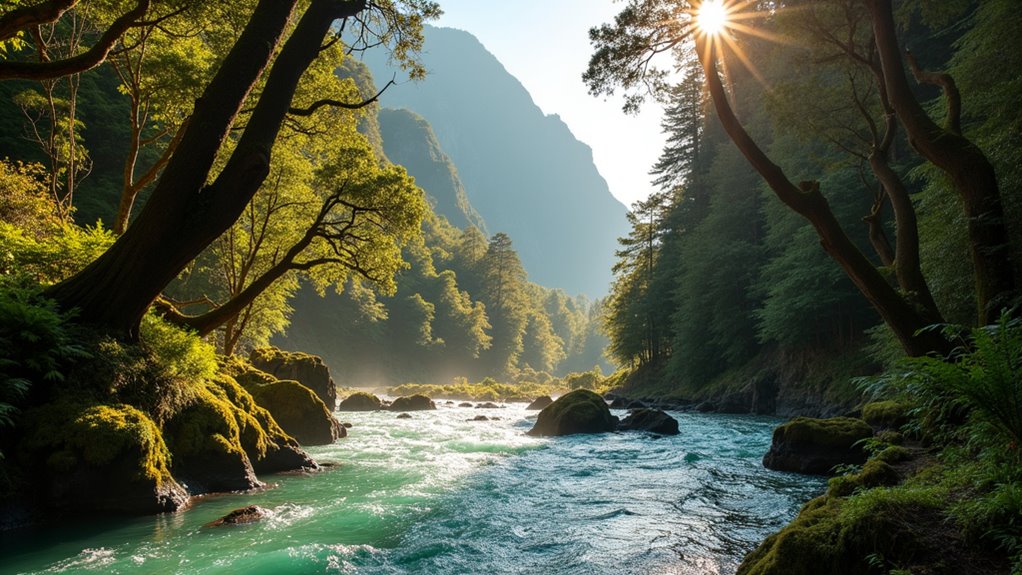
Deep within New Zealand’s Fiordland National Park, the Milford Track earns its reputation as “the finest walk in the world” through 53.5 kilometers of pristine wilderness that’ll leave you speechless. You’ll traverse ancient rainforests, cross suspension bridges over roaring rivers, and witness Sutherland Falls plunging 580 meters from granite cliffs.
Book your four-day guided walk or independent hike months ahead—only 40 independent walkers start daily during the October-April season. You’ll stay in Department of Conservation huts with basic amenities, so pack light but bring quality rain gear. The weather changes rapidly here.
Māori called this region “Piopiotahi,” meaning “a single piopio bird.” Today, you’ll spot native birds like kea parrots and hear bellbirds echoing through valleys carved by ancient glaciers. For those seeking even more challenging ice adventures, the US offers exceptional glacier climbing opportunities on some of the continent’s most spectacular frozen peaks.
Why do seasoned hikers consider Corsica’s GR20 the most challenging long-distance trail in Europe? You’ll discover the answer within your first day tackling this 180-kilometer mountain traverse.
The trail demands technical scrambling over granite slabs, charting razor-sharp ridges, and enduring scorching Mediterranean heat.
You’ll experience Corsica’s fierce independence through mountain refuges where locals serve hearty Corsican charcuterie and share stories in rapid-fire French-Italian dialect. The island’s rugged interior reveals why Napoleon claimed he could recognize Corsica blindfolded by its scent.
Essential considerations for your GR20 adventure:
Many sections involve steep ascents that require mastering uphill cycling techniques adapted for hiking, including maintaining steady pacing and strategic gear shifting between walking poles and hands-free scrambling.
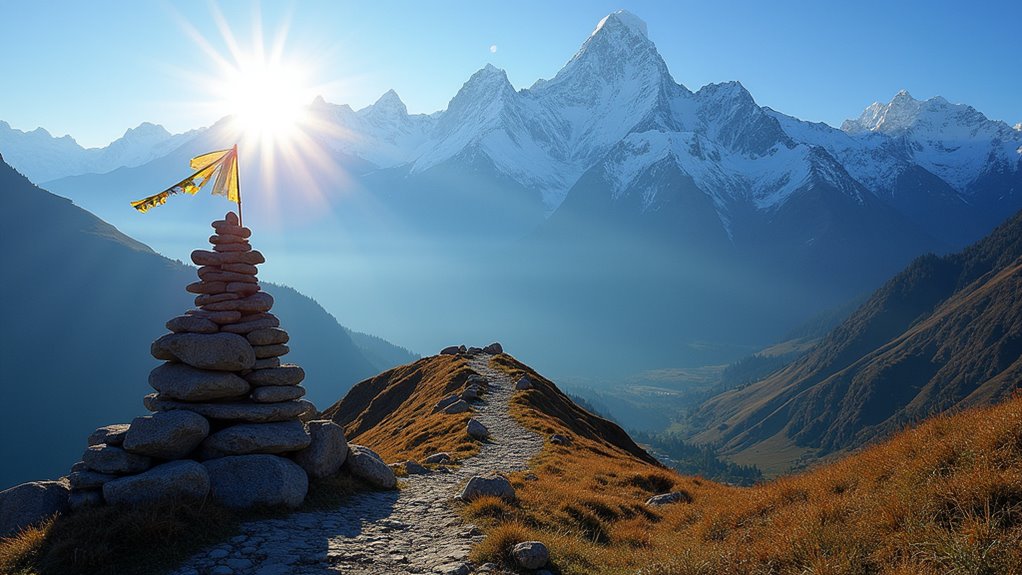
Twenty-one days of trekking around the Annapurna massif will transform your understanding of high-altitude adventure. You’ll climb from subtropical valleys at 800 meters to the challenging Thorong La Pass at 5,416 meters, experiencing dramatic climate shifts that’ll leave you breathless—literally and figuratively.
From lush subtropical valleys to oxygen-thin mountain passes, the Annapurna circuit delivers altitude challenges that will redefine your adventure limits.
The clockwise route offers better acclimatization, starting in Besisahar and finishing in Pokhara. You’ll traverse diverse landscapes: terraced rice fields, rhododendron forests, alpine meadows, and stark high-altitude deserts.
Local teahouses provide accommodation and meals, connecting you with Gurung and Thakali cultures.
Pack layers for temperature extremes and prepare for altitude sickness above 3,000 meters. Spring and autumn offer the clearest mountain views. Don’t rush—those extra acclimatization days in Manang could save your trek. Consider whether renting or buying specialized high-altitude gear makes more financial sense for your trekking adventure.
While most Alpine routes demand technical climbing skills, the Dolomites Alta Via 1 welcomes hikers with stunning accessibility across Italy’s most dramatic limestone peaks. You’ll traverse 150 kilometers of UNESCO World Heritage terrain, experiencing the region’s unique Ladin culture firsthand.
This 10-12 day journey connects mountain refuges where you’ll taste hearty South Tyrolean cuisine and hear locals speak three languages. The trail’s moderate difficulty makes it perfect for experienced hikers seeking Alpine grandeur without extreme technical challenges.
For those who prefer exploring on two wheels instead of on foot, many bike-friendly cities across the USA offer excellent urban adventures and cycling infrastructure.
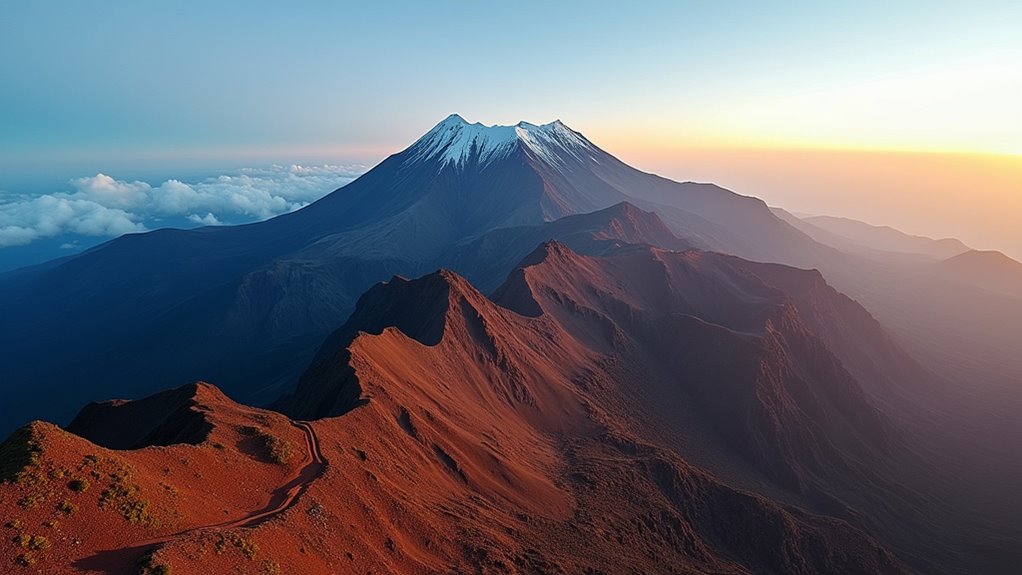
Eight days on Kilimanjaro’s Northern Circuit route transforms your understanding of Africa’s highest peak from tourist destination to profound personal journey. You’ll traverse diverse ecosystems, from lush rainforest to alpine desert, while acclimatizing gradually through the longest route available.
This path offers Kilimanjaro’s best summit success rates—nearly 95%—because you’re spending extra days adjusting to altitude. You’ll encounter fewer crowds than popular Machame or Marangu routes, especially on the remote northern slopes where wildlife sightings are common.
Your Chagga guides share ancestral mountain knowledge, explaining medicinal plants and local customs. The extended itinerary includes camping beneath starlit African skies and crossing the dramatic Lava Tower.
The Northern Circuit joins other world-class rainforest hiking trails that offer unparalleled opportunities to experience pristine wilderness environments.
Why does the John Muir Trail consistently rank among America’s most coveted wilderness experiences? You’ll traverse 211 miles through California’s Sierra Nevada, following the footsteps of America’s most influential naturalist. This isn’t just hiking—it’s a pilgrimage through granite cathedrals and alpine meadows.
The trail demands respect: permits book out within minutes, and you’ll need wilderness skills for the 2-3 week journey. You’ll cross thirteen passes above 11,000 feet, including the highest point in the contiguous US at Mount Whitney’s summit.
Essential considerations:
For the ultimate wilderness immersion, consider tent camping along the trail rather than seeking RV-accessible alternatives, as it allows you to fully disconnect from modern conveniences and experience nature’s raw beauty.
You’ve now discovered trails spanning six continents and over 500 miles of combined hiking distance. Whether you’re drawn to Patagonia’s windswept peaks or Nepal’s prayer flag-draped passes, each path offers more than stunning views—you’ll encounter local cultures, from Sherpa hospitality to Quechua traditions. Don’t feel pressured to tackle them all at once. Start with one that matches your fitness level and cultural curiosity. Your hiking boots are waiting for their next adventure.